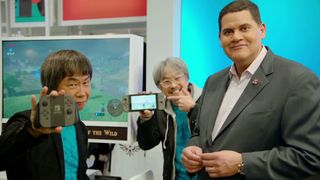
Nintendo wasn’t 100% clear on the differences between the two versions of The Legend of Zelda: Breath of the Wild, the next iteration of the world’s most well-known franchise coming to Nintendo Switch and Wii U.
We knew the experience would be comparable between the two consoles but, as it turns out, there’s going to be one major change. Well, OK, 180 changes.
Nintendo told IGN today that the Wii U version of the game would only be able to run at a 720p resolution while the Switch version, when docked, will be able to do 900p. Obviously 900p isn’t as good as full 1080p but considering that PS4 and Xbox One often suffer from the same problem, there’s no reason to work yourself up too much about it.
Both versions of the game will run at 30 frames per second (boo!) but the Switch version will benefit from higher quality environmental sounds – i.e. You might actually be able to hear the aforementioned breath of the wild on the Switch version of the game.
In all seriousness, though, the improved ambient sound will improve the overall immersiveness of the game, and is therefore the recommended route to take.
You call it Deku, I call it Deeku
While the resolution and audio details were the two larger discrepancies between the two versions of the game, Nintendo mentioned a few other small differences you’re likely to notice if you play the two side-by-side.
According to the source, “Some icons, such as onscreen buttons, differ between the two versions” and the “Special Edition and Master Edition of the Wii U version are not available.”
Get daily insight, inspiration and deals in your inbox
Get the hottest deals available in your inbox plus news, reviews, opinion, analysis and more from the TechRadar team.
That’s kind of disappointing for fans of the series looking to own the collector’s edition, but it’s understandable that Nintendo doesn’t want to overproduce something that may not sell.
The Legend of Zelda: Breath of the Wild will launch on both systems March 3, 2017.
Nick Pino is Managing Editor, TV and AV for TechRadar's sister site, Tom's Guide. Previously, he was the Senior Editor of Home Entertainment at TechRadar, covering TVs, headphones, speakers, video games, VR and streaming devices. He's also written for GamesRadar+, Official Xbox Magazine, PC Gamer and other outlets over the last decade, and he has a degree in computer science he's not using if anyone wants it.

